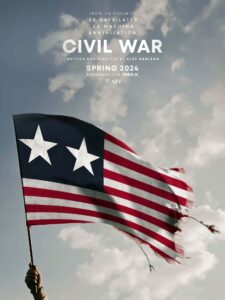 By Steve Crum
By Steve Crum
Alex Garland’s Civil War is described as a “dystopian action thriller,” which it is and maybe isn’t. Being an action thriller is definitely true. The dystopian moniker is iffy because the plot line straddles the line between what is or could be reality and fantasy. For years, there have been suggestions and threats of states seceding and declaring a war against the rest of the United States.
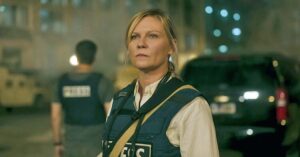 That nightmarish thought is played out in Civil War. Maybe labeling it a dystopian horror story is more apt. Factor in sad, pitiful and disgusting.
That nightmarish thought is played out in Civil War. Maybe labeling it a dystopian horror story is more apt. Factor in sad, pitiful and disgusting.
Don’t get me wrong. The professional quality of the film itself is not sad, pitiful and disgusting. But its representation definitely is such. Alex Garland impressively guides a fine cast (Kirsten Dunst, Wagner Moura, Stephen McKinley Henderson and Cailee Spaeny), cinematographer Rob Hardy, and editor Jake Roberts in this telling of what might happen if.
Crucial to its believability is a heavy reliance on digital special effects and/or AI—if there is indeed a difference.
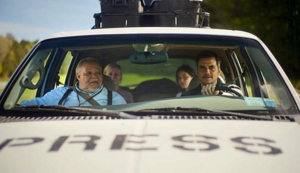 Garland’s story follows a small group of journalists driving across the United States, often through battle zones (tanks, fighter planes, bombs, rifles), to reach their goal of interviewing the controversial President (Nick Offerman) before rebel forces led by California and Texas beat them to our Capitol to kill him. Along the way the four risk their lives by snapping still photos (via 35 mm cameras?) to recount the destruction and body count at ongoing battle sites. (In this sense, the time seems to be set during the 1970s. Otherwise, why don’t they carry video or digital film cameras?)
Garland’s story follows a small group of journalists driving across the United States, often through battle zones (tanks, fighter planes, bombs, rifles), to reach their goal of interviewing the controversial President (Nick Offerman) before rebel forces led by California and Texas beat them to our Capitol to kill him. Along the way the four risk their lives by snapping still photos (via 35 mm cameras?) to recount the destruction and body count at ongoing battle sites. (In this sense, the time seems to be set during the 1970s. Otherwise, why don’t they carry video or digital film cameras?)
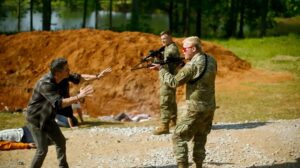 The photojournalists are Lee Smith (Dunst), Joel (Moura), Jessie (Spaeny), and Sammy (Henderson). The four actors do great ensemble work. Throughout most of the literally war-torn journey from New York City to Washington D. C., they travel by well-used car labeled PRESS on its hood. Along the trek, they encounter pockets of individual and group activists from both sides.
The photojournalists are Lee Smith (Dunst), Joel (Moura), Jessie (Spaeny), and Sammy (Henderson). The four actors do great ensemble work. Throughout most of the literally war-torn journey from New York City to Washington D. C., they travel by well-used car labeled PRESS on its hood. Along the trek, they encounter pockets of individual and group activists from both sides.
Particularly jarring is a sequence of a handful of soldiers executing citizens they perceive as enemies, and then dropping their bodies into a mass 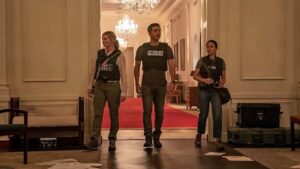 grave. The journalists find themselves directly in the middle of said mess, which escalates into tragedy. (Continued when you see the movie, folks.)
grave. The journalists find themselves directly in the middle of said mess, which escalates into tragedy. (Continued when you see the movie, folks.)
Via the dictionary, “fear, distress, and oppressive societal control” describe dystopian. Strictly speaking then, Civil War fits the grim bill.
—————
GRADE on an A-F Scale: B+
